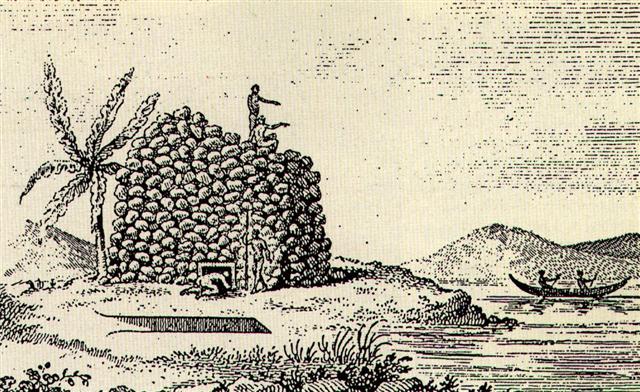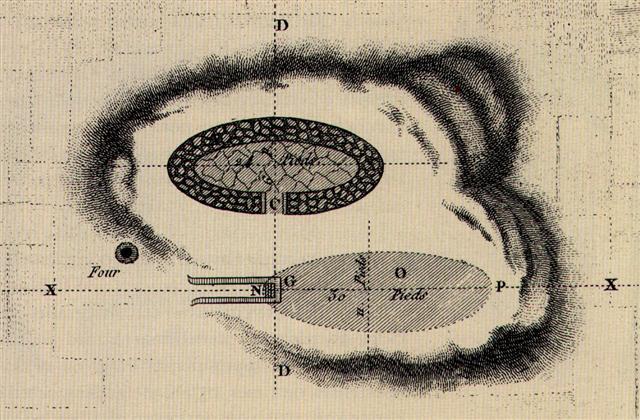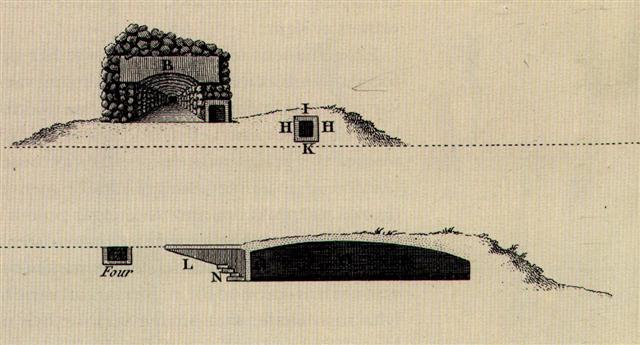The house of Hotu A Matua was a 'distance away' from the house of Tuu Maheke: ... King Hotu arose [he ea.mai.te ariki.a Hotu] and went from his house to the front of the house of Tuu Maheke, which was a distance away [he oho.mai mai toona hare.ki mua ki te hare.o Tuu maheke]. [E:93] Although this 'distance away' seems (as I read this part of the Polynesian text) to be only implied by the statement that Hotu rose up and went from his house to the front of the house of Tuu Maheke. And by the statement that he later returned to his own house: ... The father [tangata matua] got up [he ea], went [rather: returned] to his house, and stayed there [he hoki he oho.ki toona hare he noho]. [E:94] Likewise: ... After he had shouted at me like this [i rangi mai ai kia au], he returned to his house and stayed there [he hoki atu ki toona hare he noho].' [E:95] Earlier in the text we have read that the house of Hotu was Hare Tupa Tuu: ... Hotu stayed [he noho] in Hare Tupa Tuu. [E:92] Presumably this meant he was in such a stone building above ground which had a complementary subterranean abode close by with a cooking place in between - notice the upright (tuu) held by the man below the pair on the Rooftop:
Then follows what may be a faulty translation: ... The servant (tuura) of Tuu Maheke, namely Rovi [te tuura.o Tuu maheke.ko Rovi], prepared the food for Tuu Maheke [he hangai i a Tuu maheke]. Tuu Maheke stayed in Hare Tupa Tuu because of this servant, Rovi ... [E:92] Because Tuu Maheke could hardly have stayed in Hare Tupa Tuu for that was the house of Hotu. Instead Tuu Maheke presumably was staying in another house together with his servant Rovi. And only Tuu Maheke and Rovi were allowed to be there: ... The earth-oven, the lighting of fire (tumuteka; emulation te umu te ka), and the cooking (te tao) were the responsibilities of Rovi.When it was time to place (the food) into the earth-oven, to take out (the prepared food), and to take (the meal into the house) to the king, to Tuu Maheke, only Rovi was allowed to be there. He alone could supply the king, Tuu Maheke, with food. In this manner Tuu Maheke had reached (the age of) fifteen. [E:92] And Tuu Maheke could then have gone from the house of Rovi to Hare Tupa Tuu at the time when he reached maturity, presumably at the age of 15 (→ 215 - 65). ... Rovi took the eel trap. He picked it up and went to the sea to catch eel, which were supposed to be a side dish (inaki) for King Tuu Maheke's sweet potatoes [te kumara.o te ariki.a Tuu maheke]. He stayed there and went about catching eels. But Rovi stayed late catching eels, and Tuu Maheke became hungry while he waited all by himself. Night came, and King Tuu Maheke remained without food. When King Tu Maheke grew hungry, he sat down inside the house and cried [he noho-he tangi.i roto i te hare.tupa tuu]. He was all alone [hokotahi] in Hare Tupa Tuu because [no] the mother (too) had gone away to dig up sweet potatoes [te matua tamatahine.ku oho ana ki te kumara are], and cook them in the earth-oven [mo tao], and roast them, and bring them to the king. [E.93] Furthermore, Vakai - the mother of Tuu Maheke - had another house; and Hotu had shifted his location to a new house, to Hare Pu Rangi: ... The woman arose [he ea tau vie era], turned around, went back to her house, and stayed there. Hotu arose [he ea.a Hotu], moved (his residence) a short distance away [he neke.iti atu.he hakapehiva iti.ātu], and settled down. He finished building the house [he āto.i toona hare] and covering the roof [he oti te hare.te ato], and now he lived in Hare Pu Rangi [he noho.i hare pu rangi]. [E:96] Finally, we think that Hotu had changed his place also earlier, because he had once resided in Oromanga: ... The name of the residence (maara noho) of the king, of Hotu, was Oromanga. The name of the place where the roof of the house had been covered [hidden, kona] by Nuku Kehu was Hare Topa (sic!) Tuu. [E:91] I suggest we should understand this pair of similar names - Hare Topa Tuu and Hare Tupa Tuu - to refer to a pair of special houses, one above ground and the other down in the ground:
... Antares, visible in the morning sky of December-January, came to stand for summer heat; hence the saying, 'Rehua cooks (ripens) all fruit'. The generally accepted version of the Rehua myth, according to Best, is that Rehua had two wives, the stars on either side of Antares. One was Ruhi-te-rangi or Pekehawani, the personification of summer languor (ruhi), the other Whaka-onge-kai, She-who-makes-food-scarce before the new crops can be harvested ... |


